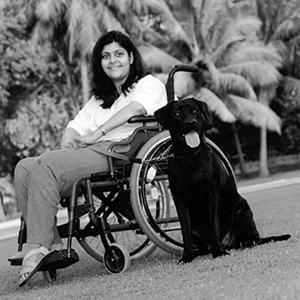
Says Shirin Merchant, India’s pioneering canine behaviourist and trainer, while talking about assistance dogs, a relatively new concept in India, where dogs are specially trained to perform a range of tasks to assist individuals with disability.
How and when did you become a canine behaviourist and trainer?
My journey as a dog trainer and behaviourist started in 1995.
What is an assistance dog and what is it trained to do?
It is very difficult for an able-bodied person to imagine the plight of a person with physical disabilities. Trivial daily tasks which we take for granted like picking up a fallen object or opening a door present a daunting challenge to the disabled. With most disabilities the person suffers from a limited use of their hands, feet and fingers. This is where an assistance dog can aid the person in being independent. A fully trained assistance dog can understand up to 50 commands. All training is done through reward based methods.
Besides opening and shutting doors, what is the range of tasks that a specially trained dog can do for the disabled?
The dogs are custom trained to the specific needs of their human partners. Here are some of the commands they can understand.
- Pick up dropped objects
- Fetch a telephone
- Drop articles in a waste paper basket
- Speak on command to alert of an intruder / or barking for help
- Get help in an emergency
- Load and unload washing machine
- Switch on and off light switches
- Fetch items from a cupboard, shelf, refrigerator or a drawer
- Cover the owner with a blanket
- Act as a support
For what disorders or diseases are assistance dogs best suited?
Assistance dogs can help quadriplegic and paraplegic people, people suffering from severe arthritis, basically any problem where the person has limited use of their hands and/or legs.
Which breed of dogs is considered best to perform tasks for people with disabilities or health disorders?
Any breed can suit the purpose though Labradors, Golden Retrievers and Labrador Golden retriever crosses are most popular breeds of choice because of their gentle nature and their strong innate instinct to retrieve.
How is the dog trained to be an assistant dog? Is the training customized to suit needs of the owner?
Yes, each dog is selectively chosen and bred to suit the needs of the person.
Is the concept of ‘assistance dog’ new in India? Do they exist here?
The concept is relatively new and yet needs to catch on.
Recently, you trained Angel as an assistance dog to help Karan, a teenager on a wheelchair, to live an independent life. Could you tell us a bit about the case of Karan and Angel?
Karan had Spinal Muscular Atrophy, a progressive disease that leads to muscle weakening, and difficulty in eating and breathing. He was confined to a wheelchair. We trained Angel, a Labrador dog for his needs. Besides the routine tasks, Angel can alert Karan’s mother in an emergency, help Karan undress, fetch his shoes from a drawer and she gently climbs up on the wheelchair step to say hello and get a cuddle, instead of leaping at Karan. Teaching her to walk on the leash, forced Karan to use dormant muscles and taught him how to balance. But most importantly, she is Karan’s best friend and constant companion.
There was a programme on CNN where a dog was taken into critical care units for children and how they helped the children heal and feel good. What is your view on that?
Dogs are excellent at helping us cope with stress and in times of sadness. Their unconditional love and faith in humans gives us the strength we require to overcome difficult times. A recent study showed that when conducting a task that’s stressful, people actually experienced less stress when their pets were with them than when a supportive friend or even their spouse was present!
Researchers feel that this may be partially due to the fact that our pets love and accept us for what we are and don’t judge us or impose their opinions on us.
What about senior citizens - Could they benefit by keeping assistance dogs?
Yes, of course. Anyone of any age can benefit.
Are dogs good stress busters?
Studies have been conducted which show that when a disabled individual is paired with a service animal, the physical aspect of the relationship is not the only part that benefits.
Through the pairing, a strong emotional bond often forms between the human and canine. As a consequence of this bond, many areas of the owner’s well being are enhanced, making that person grow in self-esteem, confidence, independence, and cheerfulness.
The dogs provide a vehicle for people to see past the disability and see people with disabliity as human beings with feelings.
A case study of Sanam Karunakar







